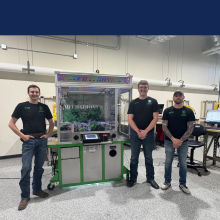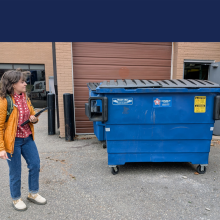Experts discuss potential workplace difficulties of marijuana legislation
Here’s what the experts had to say
The Minnesota Chamber of Commerce’s Women in Business series continued with an event focused on the impact of the potential marijuana legislation currently being talked about at the Capitol, which culminated in a panel with experts covering a wide breadth of issues, including legal ramifications, worker’s comp, and a medical perspective.
It is essential for workplaces to be prepared of new realities surrounding the potential legalization of marijuana, and the Chamber is here to assist those businesses every step of the way. Panelists included:
- Kathy Bray, Senior Vice President and Chief Legal Officer, SFM
- Alta DeRoo, MD, Chief Medical Officer, Hazelden Betty Ford Foundation
- Nicole Truso, Partner, Faegre Drinker
Alta DeRoo, MD, Chief Medical Officer, Hazelden Betty Ford Foundation
Laura Bordelon: I'm going to start with Dr. DeRoo and ask about Hazelden’s position and view on recreational marijuana.
Alta DeRoo, MD: Yeah, so we did recently come up with a position statement because we had so many folks asking about marijuana. ‘Can I bring it into treatment? My doctor considers it a medicine.’ These types of things. So, we can see this, this cloud of marijuana use, coming our way in all of our facilities. And so what we settled on as an organization is that while a person may benefit from medical marijuana in the public space, there's not really a place for it in residential treatment just yet. It still is a Schedule I drug with high abuse, and so we wouldn't use it in any of our facilities.
However, we do have many outpatient facilities. And at these outpatient facilities, people go on with their normal everyday activities. And if engaging in marijuana use for whatever reason is part of that, we try to get them away. We try to let them know that it really compromises their long-term recovery, whether they’re being recovered from alcoholism or opioid use disorder. So, our position is that it is not really beneficial for long-term recovery, may actually compromise it, and it's not part of our regimen when we treat somebody with substance use disorder.
LB: Tell us, what's the common thread between marijuana use and other substances?
AD: Yeah, great question. When I have patients come to me, and we do a history and physical, it's one of the first things that you can get done when you come into a doctor's office. We take a very thorough history, and, even though the person may not be coming in for marijuana, I find that marijuana is one of their drugs of choice. So, they may be coming in knowing that they're using fentanyl, they may be coming in knowing that they have an alcohol abuse disorder or opioid use disorder, but a very common thread is this early marijuana use that they started in some form. And what's funny is that they're not there to stop their marijuana [use]. They're there to stop their alcohol [abuse]. They're there to stop their fentanyl, their opioids, because they see these other drugs of choice as things that are going to kill them quickly. And so sometimes they're less reticent to give up the marijuana. And we do know that marijuana use potentiates the brain cells, [and] makes the brain cells more sensitive to liking other drugs.
I am going to get nerdy on you for a little while, but there are studies in fetal rats that show when the mom has taken marijuana during the rat's pregnancy, when these babies are born and they're given something like an opioid, they like the opioid quicker and much more than those other baby rats that were not exposed to marijuana. So when we say gateway drug, that is one of the reasons why this is seen as a gateway drug is because [marijuana] makes those brain receptors more susceptible to liking these other drugs more and more quickly.
LB: We're not the first state that's considering legalizing [the] recreation of marijuana. Clearly, you operate in lots of other places. What are you seeing in terms of addiction, recovery [and] drug use in the other states that have made recreational marijuana legal?
AD: So SAMHSA is a great website that does a great job in pulling all of the attitudes and who's using what type of drugs. And what we found in those states that have already legalized recreational marijuana [is that] the perception of risk has decreased amongst folks thinking that my state has allowed us to use it for recreation. ‘This word recreation, this is for fun. You know, my state has allowed me to use this for fun. How could it be bad?’ So, they measured that perception of risk, which has gone down, and especially for our high school-age kids, we see this perception of risk decreases.
Now, one of the things that I don't think these folks are also considering is that even though their perception of risk is going down with THC, the THC content itself is at a higher risk. So, the THC content of the 1970s, when we all hear stories or if we were involved with heavy use back in the 1970s, that's 2%, 3%, rarely would you see anything above 5% that was smoked or used back then. But now, when the FDA seizes this marijuana, they're seeing 12%, 15%, all the way up to 25% THC content. And so, even though the risk of the act of using marijuana is decreasing, that perception of risk is decreasing in these states. The toxicity, the content of that THC, is not regulated, and it's getting much higher and less predictable.
LB: And is marijuana use commonly part of the mix in terms of other drug use that you see in people that come to Hazelden Betty Ford?
AD: It's common when a lot of people are using depressants. So, if somebody is using benzodiazepine, a central nervous system depressant, or they're using something like alcohol, we often see that marijuana is a companion to those.
Nicole Truso, Partner, Faegre Drinker
LB: One of the things that we hear a lot about is that there's no impairment test, that it's hard to determine the impairment. How do you answer that, Nicole?
Nicole Truso: Yeah, that's absolutely right. I think a lot of times we hear recreational marijuana compared to alcohol and the idea that you can use controlled substances like alcohol and not have it impact your workplace. And that's true, but it's very easy, and there are a lot of numbers that can be attached to alcohol impairment that are pretty common standards in the industry. Marijuana doesn't have [those standards], and we've seen efforts in some states to try to put that impairment level in their driving statutes, but it hasn't really come to fruition so that there is a standard that can be involved.
So when we look at something like the current Minnesota bill, it allows employers to take action if someone is using onsite. Well, the number of times someone's going to be caught red-handed actually using on-site are pretty limited, or they're impaired by the use, but we don't have a test to decide impairment. And so, at that same point, you're going to be making judgment calls, and there will certainly be legal challenges as to whether someone was truly impaired at work, which opens up a lot of legal risk for those employment-based claims on that basis.
LB: So that's tricky. That's tricky for a manager or team leader. How do they handle a situation where they think someone is impaired? What is an employer supposed to do in those circumstances?
NT: Yeah, in Minnesota, we are blessed to have very complicated employment laws already <laughter>. In particular, our drug testing law is already one of the most complicated in the country. And so, my tip on all of this is [to] think about whether testing really is the right answer anymore, and try to impose the confidence in your frontline managers that workplace safety violations, a violation of a rule behavior that you see, even short of a drug test, should be your first gut reaction, not that testing.
In Minnesota, if you have [a] positive test result [from] a current employee, you have an obligation to give them a second chance, to give them the opportunity to participate in a treatment program [and] to have that substance abuse evaluation. And so, taking action [from] that safety standard of violation based on conduct could actually save you a lot of hassle and take the test completely out of the equation.
LB: But employers can still test right?
NT: That is a debate that is out there. You absolutely can still test. The current version of the bill has some restrictions based on random testing and pre-employment testing, but reasonable sufficient testing is still on the table, even for marijuana, under the current version of the bill. But it's one of those questions of ‘do you want to know the results of that?’ Because if it is positive for recreational marijuana, you may have your hands tied on what steps you can take next.
Kathy Bray, Senior Vice President and Chief Legal Officer, SFM
LB: I want to talk a little bit about work comp because obviously, workplace accidents are going to happen. What does recreational marijuana becoming legal mean from an insurance perspective?
Kathy Bray: Well, from the work comp insurance perspective, it really doesn't change the landscape that much because impairment is impairment. And because of all the intricacies and complexity that Nicole highlighted, it's hard to say if you're at this level and this many hits, this kind of edible, you are going to be either punished under the work comp statute as being intoxicated when you have an injury or have some kind of performance-related problem. There is just a big gray muck out there. And so what it comes down to is if you've got someone who is impaired on the job, has a work injury, if you can prove they're intoxicated in Minnesota and that was a direct cause of the injury, you might be able to bar compensation with lots of pet defense.
If as an example, one of the few reported cases someone tested positive for illicit drugs [and] had fallen off a roof. But the judge found them credible because of the dimensions of the roof, the steepness and lack of safety constraints, that that was the cause of the accident, even though they were probably severely impaired in terms of their reaction time. And that's what you're going to have to tease out. And it's really important that your safety program is your best defense when it comes to how it affects the work comp insurance world. Uh, because you cannot control the use, you cannot control what impairment looks like, and if it's a legal substance, you can't punish the use of a legal substance except for the litany of exceptions they have on like page 250 of the bill. So it's going to be a complex situation to work through.
But impairment is impairment; safety is safety, and no matter what the substance, whether it be alcohol, illegal drugs, legal drugs or lack of sleep even, have a good safety program where your frontline people and your coworkers are keeping an eye out for each other and reporting things that are unsafe And then, enforcing those safety rules that aren't being followed.
Click photos to view full size and ESC or refresh to return to page.
Interested in future Minnesota Chamber events?
Join us on March 31 for the 2023 Workforce Summit. Attracting and retaining talent is one of the most pressing issues facing Minnesota employers. Minnesota’s labor shortage, and decline in labor force participation is also hindering productivity and economic growth. Minnesota’s labor force projections are not likely to change for at least the next decade, so it is imperative that everyone has the opportunity to engage in Minnesota’s workforce. The Workforce Summit will provide best practices and solutions for employers seeking to address their workforce shortages, and strategies to break down employment barriers.






